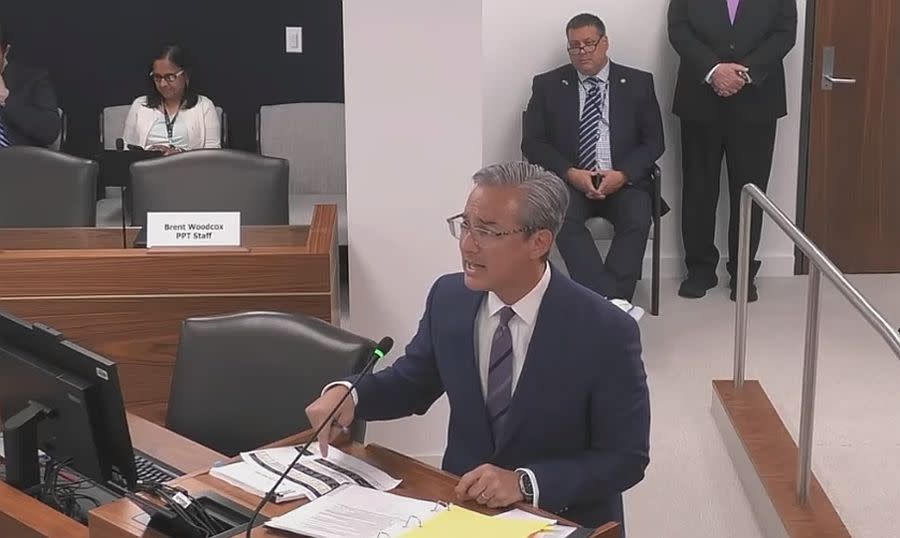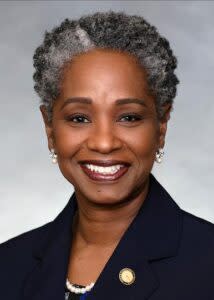Bill to increase spending on private school vouchers scores key win in NC Senate

Sen. Michael Lee said traditional public school wasn't there for his youngest child. He wants all parents to have access to private school vouchers. (Photo: NCGA video stream)
A bill to spend an additional $463 million on the state’s controversial private school voucher program over the next two years gained momentum Thursday, winning support in the state Senate. The bill was approved by a vote of 28-15 and will now return to the House for concurrence in Senate changes.
Republican supporters of House Bill 823 contend the extra money is needed to clear a wait list of more than 54,000 people for the state’s “Opportunity Scholarships.” The income-based program helps parents with private school tuition; awards range from $3,000 to $7,000.
Funding ran out after scholarships were offered to 13,511 applicants in the lowest income tier and about 2,300 in the second income tier.
Sen. Michael Lee, R-New Hanover, said education dollars should follow students where ever they attend school.
“Clearing these waitlists fulfills our commitment to families from across the state that want a stronger say in their child’s education,” said Lee, who chairs the Senate Appropriations and Education committees. “From public schools to public charter schools, and private schools, North Carolina is at the forefront of school choice and education freedom.”
Senate leader Phil Berger, R-Rockingham, said in a news release that parents have made it clear that they want educational freedom and school choice.
“The incredible interest in Opportunity Scholarships means thousands of families are now in limbo,” Berger said. “We must clear the waitlist so families can prepare for the upcoming school year.”
If approved HB 823 is approved, annual state spending on school vouchers would increase to $800 million by the 2031 fiscal year, which is $295 million more than projected.
Democratic senators said the increase in spending on private school vouchers is tantamount to “welfare” for the state’s wealthiest families whose children already attend private schools without state assistance.
Sen. Natasha Marcus, D-Mecklenburg, noted that 70% of vouchers funded in the bill would go to families of four earning more than $115,000 and 23% would go to families earning $260,000 or more a year.
“Zero for the lowest-income families — they’ve already been funded, they don’t need this bill,” Marcus said. “This is welfare for the wealthy. This is not about helping middle-class or low-income families choose the school that they want their kid to go to.”
Asking low- and moderate-income families to help millionaires pay private school tuition is like asking them to help rich families pay for a child’s Porsche, she said.
“That’s what this bill is doing and it’s wrong,” Marcus said.
Doubling down on remarks she made Wednesday in a Senate committee, Sen. Amy Galey, R-Alamance, said the $3,000 voucher the wealthiest families are eligible to receive is a fraction of what those families pay in taxes.
A family with an income of $1 million a year now pays $45,000 in state taxes, Galey said.
“If they get the full award of $3,360 scholarship if they have a family of four … then more than 90% of their taxes are still paid and they still support public education,” Galey said.
The program was created a little more than a decade ago with the stated purpose of helping low-income families escape low performing schools and districts. Now, there are no income restrictions. The number of families seeking private school vouchers exploded after the Republican-led legislature expanded the school voucher program to make it accessible to the state’s wealthiest families.
Sen. Val Applewhite (Photo: NC General Assembly)
Sen. Val Applewhite, D-Cumberland, told her Senate colleagues that concerned educators are dialing “911” for public education.
“They’ve been dialing 911 for public education to this General Assembly and they feel like the phone call is going to voicemail or you’re just not picking it up,” Applewhite said.
She said that in low-wealth, high-poverty counties such as hers, every dollar matters. Losing students to charter schools or private schools severely impacts public schools in low-wealth counties, she said. State funding is tied to enrollment, so when districts lose students, they also lose the allocation.
“It’s a $17 million impact to Cumberland County Schools,” Applewhite said.
She noted that public officials are fond of thanking members of the military for their service. Cumberland County is home to Ft. Liberty, which is one of the largest military complexes in the world.
“You know how you thank us for our service, help educate our children in Cumberland County and all of the other communities that host military installations,” said Applewhite, an Air Force veteran. “We can no longer continue to say thank you for your service and not fund or support the most important people in our lives, our children.”
Republicans turned back two amendments during debate on Thursday — one of which would have required private schools to provide performance and attendance data for students who receive vouchers. The amendment would have also required private schools that take voucher money to follow state curriculum standards, accept students with disabilities, and provide free and reduced-priced meals.
“If we’re going to give another $463 million to private schools, then we ought to have some accountability,” said Sen. Gladys Robinson, D-Guilford, who put forth the amendment. “Private schools that receive taxpayer funding need to provide the same level of student services.”
Gov. Roy Cooper has called for a moratorium on school vouchers until the state’s public schools are fully funded. Under the voucher program, he contends, taxpayer money is spent on private schools that aren’t required to hire licensed teachers, provide meals, transportation or services for the disabled.
“They [private schools] don’t have to tell taxpayers what they teach, how their students perform, which students they will reject or whether students even show up at all,” Cooper said in March during a State Board of Education meeting. “That is a reckless, reckless waste of taxpayer money.”
The post Bill to increase spending on private school vouchers scores key win in NC Senate appeared first on NC Newsline.


